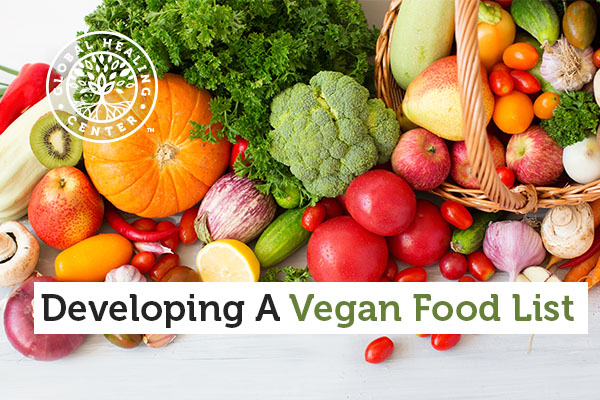
Technically speaking, human beings do not need to consume any meat or dairy products to live long, healthy lives. At face value, some people may view a vegan diet as a restrictive diet but in all actuality, a vegan diet can absolutely include many foods that can supply you with every vital mineral and organic compound you need... if you consciously plan your diet with fueling, detoxing, and cleansing your body in mind.
Once you decide to eliminate animal products from your daily life, your next step should be to develop a vegan-friendly food list you'll be selecting your foods from instead. Put together a list? Absolutely. More than focusing on what you not to eat, it's important to know what you will be eating. Developing a vegan friendly diet isn't much different than any other, your goal still needs to be to include all of the important food groups and meet all your nutritional requirements. A wide range of foods will do more than ensure a good serving of nutrients, it will also avoid monotony.
What Should Vegans Eat?
Two things to make certain you have on this list are yellow-orange vegetables and dark-green, leafy vegetables. The Physicians Committee for Responsible Medicine recommends that vegans eat a minimum of three vegetable servings a day. They also recommend two servings of legumes, which include lentils, many varieties of peas, and different types of beans. Whole grains top the priority list at five servings per day. You can get these grains from a variety of food types, including bread and pasta. Whole grains are also believed by some researchers to reduce the risk of cardiovascular disease, Type II diabetes, and certain types of cancer.
The PCRM also recommends eating three servings of fruit. Research has shown that fruits high in acid are excellent for body detoxification and cleansing. Fruits such as the apple are rich in calcium. There are plenty of other fruits that are also great sources of calcium.
Vegans and Protein
Protein is sometimes thought to be a tricky item for vegans to get adequate amounts of. All of us were raised to think of red meat, fish, poultry, and eggs as our primary source of protein. Not only that, it's very common to be conditioned to use meat as an easy source of protein. This isn't exactly an incorrect belief. The simple fact of the matter is that animal tissue contains high quantities of protein and is thus our most convenient method of obtaining it. However, what we were not taught very clearly is that protein is nitrogenous in nature, meaning that it is based on the nitrogen found in plants. The reason that herbivores have such high protein concentration in their meat is because they consume plants all day long. Eating similar plant material will allow you to get all the protein you require just as countless species of vegetarian animals do every day.
The best sources of protein are lentils and nuts. Almost all vegetables, too, have some amount of protein. Adult men require 2.5-2.9 mg protein a day, while adult women require 2.1 to 2.4.
Vegans and Calcium
Another must for the vegan food list is calcium. Once we eliminate the myth that cow’s milk is our primary source of calcium, we replace it with dark green vegetables such as bok choy, broccoli, and collard greens; even tofu. Persons under 50 require 1,000 mg calcium per day, while those over 50 require 1,200 mg per day. If you find yourself missing the taste of milk, try hemp milk, almond milk, or coconut milk.
Check out this recent article for a very handy reference of fruits and vegetables and the nutrients they provide.
†Results may vary. Information and statements made are for education purposes and are not intended to replace the advice of your doctor. If you have a severe medical condition or health concern, see your physician.








